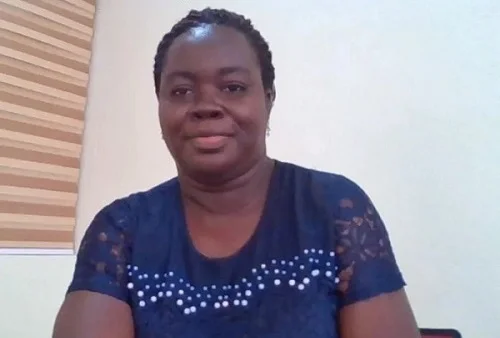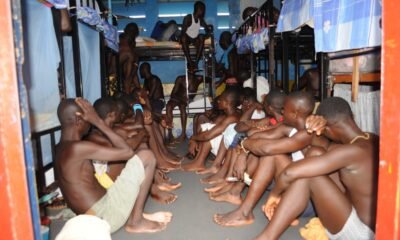Hot!
‘Don’t use places of worship for chastisement

● Sheikh Shaban speaking at the meeting
Mosque and other places of worship should not be used for chastisement but a place to embrace those considered wayward and reform them in love to become very responsible people in society.
Islamic Cleric in the Upper West Region Sheikh Shaban Mohammed Alhassan who said this, noted that oftentimes places of worship had been used to chastise people who were struggling with certain forms of secular addictions and had prevent such persons from approaching the places of worship for emotional support and advice.
“Imagine a young girl going to a place of worship to confide in the Cleric about an unplanned pregnancy as an adolescent in a bid to get emotional support and words of encouragement when she is yet to get married; such news will definitely not be welcomed by a Cleric and the girl would definitely be chastised”, he said.
To this end, the Sheikh has advocated the establishment of adolescent corners at major mosques to help meet the needs of youth who had issues with receiving education on sexual and reproductive health.
The Islamic cleric made this known at a meeting on sexual and reproductive health at Wa by youth advocacy groups in the region.
He said that in order to achieve this, engagement meetings on sexual and reproductive health and adolescent sexual behaviours should include religious leaders so that they would be updated with happenings in that area and the role they were to play to curb the situation.
“When the Ghana Health Service for instance presents statistics on the number of children sexually active or use contraceptives within a specific time-frame because they want to indulge in sex to the clerics at such meetings, they will come to terms with the real happenings on the ground and accept to identify ways to assist in the education of these young ones”, he said.
He indicated that these statistics could assist the clerics in preparing their sermons to include issues of such nature and to sensitise the youth to abstinence.
The cleric who was concerned about the trend said some of his colleagues needed capacity building to be abreast of issues of the secular world and appreciate the need to freely talk about them and help educate the young ones.
He believed opening an adolescent corner at major mosques and equipping the facilities with a health worker who understood the word of God would help put adolescents in check and maintain responsible sexual behaviours amongst them.
From Lydia Darlington Fordjour, Wa
Hot!
Swedru All Blacks back to winning ways, Roshan humble King Faisal

Sekondi Rospak FC made it eight wins in eight successive home games after three second-half goals from John Amoah, Joseph Ntow and Stephen Anthony Kofi. John Amoah opened the scoring in the 55th minute after a barren first half. Joseph Ntow added to the tally in the 56th minute before Stephen Anthony Kofi rounded things up in the 74th minute to give Rospak a 3-0 win over former Premier League side King Faisal.
Elsewhere at Swedru – leaders Swedru All Blacks humbled PAC Academy in an emphatic 2-0 win. Zayat Bubakari scored first for Swedru All Blacks in the 27th minute before Rudolf Junior Nana Kwasi Mensah made it 2-0 in the 34th minute. Swedru All Blacks are top of the table with 36 points – 4 points ahead of second placed Rospak FC.
Meanwhile, Former Premier League side Cape Coast Mysterious Dwarfs recorded their fourth successive home victory after beaten New Edubiase United 2-1 at the Robert Mensah Park. Enoch Odoom struck first for Cape Coast Mysterious Dwarfs in the 19th minute but Steven Asante equalized for New Edubiase United before halftime. After the interval, Godfred Eshun scored from distance in the 65th minute to help Cape Coast Mysterious Dwarfs secure all the points.
Here are the results in Zone Two

Hot!
Cervical Cancer alert: Avoid sex at early age

The Programmes Manager of Non-Communicable Diseases (NCDs) of the Ghana Health Service (GHS), Dr Mary Efua Commeh, has advised young girls to avoid sex at an early age.
This, she explained, will give the cervix the opportunity to mature before they become sexually active.
“You need to delay what we call the first sexual intercourse as much as possible to give the cervix the opportunity to mature before the person becomes sexually active,” she said.
Dr Commeh stated this in an interview with The Spectator in Accra on Tuesday as a part of the Cervical Cancer awareness month.
According to her, cervical cancer was the second leading female cancer in Ghana with a total of about 3,072 cases annually, and out of that, 1,815 deaths are recorded, representing more than 50 per cent.
She indicated that “If young girls are going to be sexually active, then you need to talk to your parents about being vaccinated.”
She explained that vaccinating young girls against human papillomavirus (HPV) has been found to be a very effective way of preventing cervical cancer.
“There are countries that started HPV vaccination years ago and they are not seeing any cervical cancers now because they would have eliminated most of the high-risk HPVs in their women. So if the high-risk HPV is not there, then obviously the results on cervical cancers are going to go down,” she added.
Dr Commmey said the HPV vaccination is recommended for young girls aged nine to 14 years, adding that it had been found to be highly effective, not just for cervical cancers but for other HPV-related cancers, such as anal cancers, cancers of the vagina, genital warts, amongst others.
She further elaborated that the idea is to put up a barrier before the HPV comes in and that once a young female encounters it, she is already protected.
She also mentioned that for cervical cancers, the main cause is called HPV infection, saying generally, all sexually active women acquire HPV at some point in their lives.
However, the Programmes Manager of NCDs at the GHS mentioned that the body has a way of clearing the HPV, explaining that it is a natural mechanism that goes on, unfortunately, there are a few women whose HPV persists.
Moreover, she noted that the numbers for Cervical Cancer tend to be much higher because at times, clients would wait, and try all sorts of medications before they finally report to the health facility saying “we actually lose some women before they get to the hospitals with over 75 per cent of the cases coming in its third and fourth stages.”
Dr Commey, therefore, called for public awareness while ensuring the availability of information for prevention and control.
By Jemima Esinam Kuatsinu







